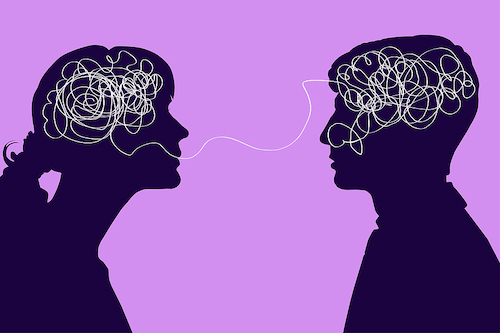 Psychologists in the UK have developed the first ever mind reading questionnaire designed to assess how well people understand what others are truly thinking.
Psychologists in the UK have developed the first ever mind reading questionnaire designed to assess how well people understand what others are truly thinking.
The researchers from the University of Bath, Cardiff and London developed the new questionnaire and in doing so determined that women are much better at understanding what others may be thinking.
“We developed the first mindreading questionnaire which could be used efficiently by researchers and clinicians to test mindreading. In developing the questionnaire, we carefully separated mindreading from empathy, to ensure we were specifically testing mindreading ability. This questionnaire will enable researchers to test large numbers of people on their mindreading ability, advancing our understanding of mindreading in adults,” Rachel Clutterbuck, lead researcher of the study, told Theravive.
“It could also be useful for clinical psychologists to quickly identify if someone is experiencing mindreading difficulties and to provide them with the appropriate support. The questionnaire may also have utility during personnel selection for employers to identify candidates who have better mindreading abilities.”
Mind reading is sometimes referred to in psychology as “mentalising” and refers to an ability to note subtle behavioural cues that might suggest a person is thinking one thing and saying another.
Everyone has different capabilities for mind reading, with some significantly better at this than others. Those who struggle with mind reading may encounter problems socially or building and maintaining relationships.
“Mindreading is something that we use every day when we interact with other people, even though we may not be aware of it. Mindreading is useful when having conversations with other people, especially to identify if someone is thinking something that they are not saying, such as being sarcastic or lying,” Clutterbuck said.
“Mindreading helps us to navigate our social lives, so those who are not good at mindreading can have difficulty making friends and can experience mental health problems.”
The questionnaire developed by the researchers could help provide those who struggle with this skill with needed support. In developing the test, the researchers used data from more than 4000 people in the UK and US, some of whom had autism.
“We found that just four questions could reliably measure mindreading, and this became our questionnaire – the Four-Item Mentalising Index. Using advanced statistical techniques, we found that the questionnaire was interpreted in the same way by men and women, and by autistic and non-autistic people. This means that it can be reliably used to test mindreading differences between men and women, and autistic and non-autistic people,” Clutterbuck explains.
“Following this line of enquiry, we found that there were differences between men and women in their mindreading ability, with women reporting better mindreading ability than men. We also found that autistic people reported having more mindreading difficulties than non-autistic people, in line with previous research.”
The researchers note than mind reading is different from empathy. While mind reading is based on understanding what another person is thinking, empathy is about understanding how others feel. Although similar, the difference is important as each skill requires different brain networks.
The new test takes less than a minute to complete and the researchers say could have important use in clinical settings. They argue it isn’t always easy to determine if a person is having difficulty understanding or responding to others. In some cases, people learn techniques which enable them to minimise their social difficulties in this area, even though they still struggle.
The test may enable clinicians to better understand those who struggle to understand others through mind reading, in particular those with autism. It also enables clinicians to assign a person who takes the test an exact score which can help identify those who would benefit from intervention.
“There are psychological interventions developed to improve mindreading skills. Although, people who have difficulty with mindreading should first seek advice from a qualified professional, such as a clinical psychologist,” Clutterbuck said.
Those interested in trying the questionnaire and receiving feedback on their ability to mindread, can do so by clicking here.
Elizabeth Pratt is a medical journalist and producer. Her work has appeared on Healthline, The Huffington Post, Fox News, The Australian Broadcasting Corporation, The Sydney Morning Herald, News.com.au, Escape, The Cusp and Skyscanner. You can read more of her articles here. Or learn more about Elizabeth and contact her via her LinkedIn and Twitter profiles.